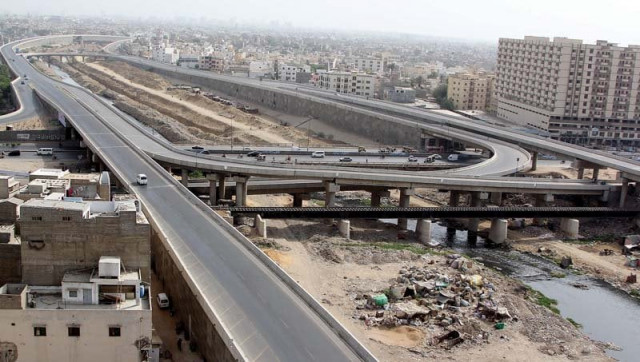Mauripur Expressway approved
Board gives go-ahead for water, sanitation, desalination projects

The Mauripur Expressway, water and sanitation and desalination projects were approved on the public-private partnership mode on Thursday as the 32nd meeting of Public Private Policy Board was held at the Chief Minister’s House.
Along with the expressway, the board approved the Link Road to Korangi, Hub water supply project of three million gallons per day (MGD) from Dhabeji to Special Economic Zone, the Lyari sewerage system, the Lyari Development Authority’s Scheme 42, a five MGD desalination plant and construction of canal from Nabirsar to Vajira on the public private partnership mode.
Expressway
The meeting agreed that the Mauripur Expressway is to be an eight-kilometre-long two into two lane project from Mauripur Expressway to Y-Junction. It would have a two lane one-way Interchange at ICI bridge.
The expressway is intended to provide speedy access to the Karachi Beach area and would be completed in two years, said Sindh Chief Minister Syed Murad Ali Shah, adding that this would bring an end to traffic congestion in the area.
The board approved the project and gave directives for tenders to be floated.
Link Road
The board also gave the go-ahead for the PPP unit to launch the Link Road to Korangi project for investor solicitation. The Link Road is to be an 11.5km two into two lane road and is to provide quick access to the Korangi Industrial area. The project is slated for completion in two years from when it begins. Construction of internal roads and a bridge within the city are to be completed under the project.
Read: Turkish aid agency sets up medical facility in Karachi
Water supply
Besides, the meeting was apprised that the Karachi Hub water supply system consisted of broad components such as the Hub Dam constructed in 1981 with a live storage capacity of 656,000 acre feet. The eight-kilometer main canal owned and operated by the Water & Power Development Authority (WAPDA) coming from Hub Dam.
The board was informed that the head regulator has been installed at the point at which the main canal splits into the Karachi Hub Canal, going towards the metropolis, and the Lasbella Canal, going towards Lasbella district in Balochistan. It was stated that 63.3 per cent of the incoming water is allocated to the Karachi canal while the remaining 36.7 per cent is supplied to Lasbella.
The meeting was apprised that the Karachi Hub Canal is a 22.4km stretch with a capacity of 100MGD from the head regulator to the city and is being operated by the Karachi Water and Sewerage Board (KWSB). The canal stretch has significant erosion and structural failure that causes water losses. Besides, the meeting was informed, there are two pump houses to transmit the water from the canal through the rising mains to the filtration plant. However, the old pump house is not functional and the new one has surpassed its design life.
It was further discussed that the two-kilometre-long pipes that carry water to the filtration plant are 38-year-old and have not been replaced since. The filtration plant has a treatment capacity of 80MGD but is mostly not functional. It has a solar power plant with a capacity of six megawatts (MW).
The meeting decided that the provincial government would talk to WAPDA authorities to share the cost of the project while giving its approval.
Besides, a project comprising the laying down of a water pipeline from Dhabeji to Special Economic Zone of 10 million imperial gallons per day (MIGD) and 20MIGD to areas in South district was approved.
Besides, the board approved funds to hire a consultant for the Lyari Sewerage Rehabilitation Project to revamp the sewerage system of the area. Besides, the board approved the project to revive LDA’s Scheme 42 and develop infrastructure and utility networks under the PPP mode.
Moreover, a five MIGD desalination project was approved under the PPP mode. The project entails a desalination plant that will utilise seawater using reverse osmosis technology, primarily to meet the water needs of Clifton and DHA areas.
The policy board also approved the proposed transaction structure, risk matrix and signing of the concession agreement pertaining to the Nabisar to Vajihar water project.
Published in The Express Tribune, January 29th, 2021.



















COMMENTS
Comments are moderated and generally will be posted if they are on-topic and not abusive.
For more information, please see our Comments FAQ